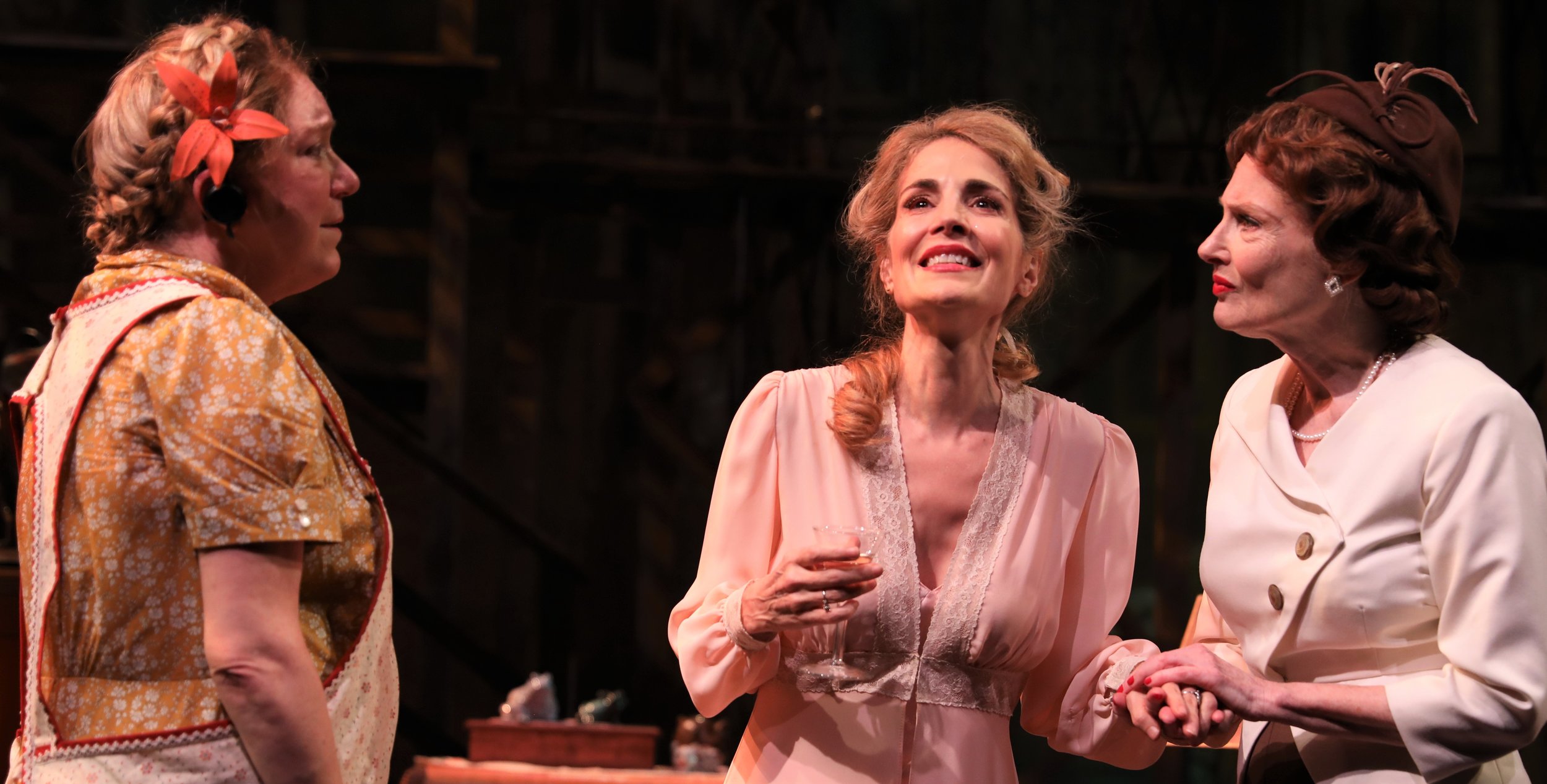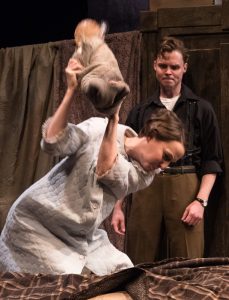In a spirited revival of John Patrick Shanley’s Italian American Reconciliation, director Austin Pendleton brings fresh verve to the tale of Huey, a lovelorn dreamer who enlists his best friend Aldo to help win back his fiery ex-wife, Janice. The production captures the play’s blend of romantic folly and heartfelt yearning that first endeared it to audiences decades ago.
Orson’s Shadow
When aging genius Orson Welles and actor Sir Laurence Olivier meet in Ireland after many years, each brings his own “baggage” and sparks fly. Add to them the characters of theater critic Kenneth Tynan; Vivien Leigh, Olivier’s almost ex-wife; Joan Plowright, Olivier’s new woman; and an audacious Irishman, and play production bedlam prevails. With Orson’s Shadow, playwright and director Austin Pendleton, together with his codirector David Schweizer, has created a masterpiece that qualifies as much as comedy as it does drama.
The Night of the Iguana
Tennessee Williams’s The Night of the Iguana is often considered his last great play, but the 1961 milestone was created amid stress and anguish. The role of Hannah Jelkes was written for Katharine Hepburn, but Spencer Tracy needed her care; Margaret Leighton played it and won a Tony. Bette Davis, difficult to imagine as the sensual Maxine Faulk, was at her most tyrannical during tryouts; she left the production after three months. Elia Kazan didn’t direct, though he lauded the work of Frank Corsaro, who did. In the end, however, the play survived, but La Femme Theatre Productions’ revival, the first in 28 years, demonstrates that pitfalls abound.
A Séance with Mom
Actress-playwright-comedian Nancy Redman has returned to the Chain Studio Theatre for the third run of her one-woman show, A Séance with Mom. Directed by Austin Pendleton, the piece is performed on a bare stage, with only a chair, small table, and walker at its side. Its six characters are conjured up by Redman with her expressive voice, elastic face, and physical comedy. Redman, who has been described as a cross-fertilization of Lucille Ball and Groucho Marx, steers clear of politics, preferring to take a deep dive into family relationships and the human condition.
This Beautiful Future
A woman walks over to a large flat-screen TV and, using the remote control, selects a karaoke track. Believe it or not, this is the start of a play set in occupied France in 1944: This Beautiful Future, directed by Jack Serio. That woman and her male counterpart—theater vets Angelina Fiordellisi and Austin Pendleton as characters named Angelina and Austin—are on stage for the entire 80-minute running time, but the story really centers on two teenagers: Otto, a German soldier stationed in Chartres in the summer of ’44, and Elodie, a local girl. They’re both painfully naive. She thinks her Jewish neighbors will eventually come home; he’s psyched to march into England and anticipates a quick British surrender.
The Glass Menagerie
Tennessee Williams’s 1945 breakout play, The Glass Menagerie, takes place in “memory,” as the brooding narrator/protagonist Tom announces at the start. In Austin Pendleton and Peter Bloch’s production at the Wild Project, Tom’s memories not only haunt the character but literally haunt the entire production with an array of spooky stage effects, which lay a chill on the evening that only the playwright’s poetry can defrost.
A Lovely Sunday for Creve Coeur
If you didn’t know that A Lovely Sunday for Creve Coeur was by Tennessee Williams, you might easily guess it. When the critic John Mason Brown reviewed A Streetcar Named Desire in 1947, he noted that play’s similarities to The Glass Menagerie: “Mr. Williams’ recurrent concern is with the misfits and the broken; with poor, self-deluded mortals… If they lie to others, their major lie is to themselves. In this way only can they hope to make their intolerable lives tolerable. Such beauty as they know exists in their dreams. The surroundings in which they find themselves are once again as sordid as is their own living.” Brown might have written the same words about Creve Coeur, first produced in 1979.
Its two main protagonists are Dorothea (“Dotty”), a young teacher, and an older woman, Bodey, from whom she rents a space in a cramped apartment (vividly evoked by Harry Feiner as a warren of furnishings with a smash of colors). The other two characters are Helena, a well-dressed, determined woman with a plan to upset the arrangement and Miss Gluck (Polly McKie), an emotional mess in a bathrobe. Her mother has recently died, and she thinks her upstairs apartment is haunted and keeps dropping down to see the sympathetic Bodey.
Kristine Nielsen (left) is Bodey and Jean Lichty is Dotty in Tennessee Williams’s A Lovely Sunday for Creve Coeur. Top: Nielsen and Lichty with Annette O’Toole as Helena.
Produced by La Femme Theatre Company, “dedicated to the exploration and celebration of the universal female experience,” Creve Coeur doesn’t have the more experimental elements of Williams’s late plays, nor even the framing device of A Glass Menagerie—although Creve Coeur is set in St. Louis, in the 1930s—but the delusions are present.
Dotty (Jean Lichty, founder of La Femme) is a struggling schoolteacher who rents space in a cramped apartment as she’s waiting for something better to turn up, specifically a phone call from Frank Ellis, the flashy high school principal who has taken her out.
Bodey (Kristine Nielsen), the landlady, is a dynamo who cooks, sympathizes and tries to interest Dotty in her brother, Buddy. Bodey has planned a regular Sunday outing for Creve Coeur, where there’s an amusement park, and she hopes Dotty will go. Buddy will be there.
Dotty knows that Bodey is playing matchmaker, despite Bodey’s denials, and she tries to emphasize her lack of interest in Buddy: “He simply isn’t a type that I can respond to…In a romantic fashion, honey. And to me, romance is—essential.” Fans of Williams can foretell there’s going to be heartbreak (crève-coeur is French for “heartbreak”), even if Dotty is shrewd enough to see past Bodey’s machinations, in Williams’s lyrical description of a grim future: “You’ve been deliberately plotting to marry me off to your brother so that my life would just be one long Creve Coeur picnic, interspersed with knockwurst, sauerkraut—hot potato salad dinners.”
Nielsen with Polly McKie as Miss Gluck. Photographs by Joan Marcus.
In spite of the lyricism, though, Williams’s extended back-and-forth between the two women feels laborious, and director Austin Pendleton, who does a fine job otherwise, makes a crucial mistake by having Bodey read a notice in the newspaper and throw it to the ground, unnoticed by Dotty; you can almost predict in the first moments that the paper has an engagement announcement involving Ellis. The action hangs like an albatross on the already repetitious dialogue of the first half.
Things pick up when Helena arrives. Annette O’Toole is a smartly dressed social climber who teaches at Dotty’s school; she has found an apartment but needs Dotty to share expenses. It’s the clash between Helena and Bodey that provides the interest.
From the start, the elegant, supercilious Helena is thwarted by Nielsen’s tough broad, and you can’t help but root for Bodey as she prevents the pushy intruder from walking all over her—even suggesting a possible physical opposition. Nielsen expertly navigates the kindness, toughness and self-delusion of her character while finding unexpected comic moments. O’Toole, too, though easy to dislike, makes Helena more than a mere snob; she is also a woman with dreams who is too proud to admit she needs a helping hand. Lichty charts Dotty’s slow disintegration of confidence and her growing fragility and frustration, but her Dotty never implodes, even when her hopes are dashed. McKie, in a part that requires little English but expertly accented German, excels in making the weepy Gluck memorable.
Ultimately, it’s the actors who refresh the tired themes of this late Williams drama. Williams fans who rarely have the chance to see his lesser plays in good productions will welcome this opportunity.
La Femme’s production of A Lovely Sunday for Creve Coeur plays through Oct. 21 at Theatre at St. Clement’s (423 West 46th St.). Evening performances are at 7 p.m. Wednesday and Thursday and at 8 p.m. Friday and Saturday; matinees are at 2 p.m. Saturday and 3 p.m. Sunday. Tickets are $55–$99 and may be purchased by calling (866) 811-4111 or visiting lafemmetheatreproductions.org.
Wars of the Roses: Henry VI & Richard III
Two years ago New York theatergoers had the opportunity to see Kings of War, Ivo Van Hove’s compilation of five Shakespearean history plays. Tracing the royal lineage of Henry V through Henry VI and ending with Richard III (with a few additional coronations in between), Van Hove’s four-hour-plus production was a grand, sweeping, and technologically sophisticated epic. Working on a much smaller scale, director, adaptor, and actor Austin Pendleton has created his own synthesis of the battles between the Houses of Lancaster and York for Wars of the Roses: Henry VI & Richard III, which is currently playing at the 124 Bank Street Theatre. A mashup of Shakespeare’s Henry VI, Part 3 and Richard III and running a mere three hours, Pendleton’s adaptation offers its fair share of both theatrical rewards and pitfalls.
The Saintliness of Margery Kempe
Can a sinner become a saint? That is the question John Wulp explores in The Saintliness of Margery Kempe, first produced in 1958 at the Poet’s Theatre in Cambridge, Mass., and last seen in an Off-Broadway production the following year. The story is loosely based on the real life of Margery Kempe, a woman who lived in the 14th century and wrote the first known autobiography in Western literature. At the beginning of the play, Margery (the wonderful Andrus Nichols, who brings an energetic intensity to the role) declares, “Morality, damn all morality, damn, damn, damn.” A feminist long before the feminist movement, she seeks to shrug off the assumptions that inform her role as mother, housewife and religious community member. She hates it all and leaves home.
The Traveling Lady
Texas native Horton Foote was a contemporary of Tennessee Williams, though he outlived the Mississippi-born playwright by more than a quarter century. In a long career, Foote—like Williams—channeled voices of small-town eccentrics in dramas depicting the region where he spent his formative years. Five such eccentrics, embodied by top-flight character actors giving memorable supporting performances, rescue the otherwise anodyne revival of Foote’s The Traveling Lady, presented by Cherry Lane Theatre and La Femme Theatre Productions, and make it worth an evening’s time.
Luft Gangster
Lowell Byers’s play Luft Gangster was inspired by the real-life story of Louis Fowler, a waist gunner during World War II. The play opens on a tender scene between Lou (played by Byers himself with a wonderful mix of stoicism and sincerity), and his mother, who is clearly sick or mentally ill. Louis’s father is long dead, and when his mother dies, he enlists to fight. His plane is shot down and he is captured and interrogated by the Nazis, but they don’t get a word out of him. At first he’s put in a makeshift holding cell where he is joined by another flier, Joe, played with a wonderful earnestness by Sean Hoagland, who doubts they’ll get out alive. Lou tells him, “I don’t think it’s my time to go.” Joe retorts: “I just hope they know that.”
Young But Wise
Shelagh Delaney was only 18 when her first play, A Taste of Honey, premiered in London in 1958 and she added to the gender diversity of the Angry Young Men of postwar British theater. The play was developed at the acclaimed producer Joan Littlewood’s Theatre Workshop, and it contains some of Littlewood’s hallmarks, notably a jazz trio playing standards that evokes the British music hall (a popular influence in British theater, used by John Osborne as the setting for The Entertainer and by Littlewood herself in Oh, What a Lovely War!—and on through Privates on Parade, right up to One Man, Two Guv’nors in 2011).

As with Osborne, Arnold Wesker, and John Arden, the focus of the “angry theater” was the travails of the working-class English. Delaney’s play is set in Manchester, and concerns Jo, who is 17 and lives with her mother, Helen (Rachel Botchan), a sometime prostitute. For the late 1950s, and for an author of 18, A Taste of Honey is astonishingly frank and casual about taboo topics of the period. Jo refers diffidently to Helen’s “immoral earnings.” Jo herself has an affair with a black sailor (Ade Otukoya) and becomes pregnant by him. She sets up house with a fellow art student, Geoffrey (John Evans Reese), who is gay and has more nurturing instincts toward her than Helen does.
Jo’s fractious relationship with her mother is, in Delaney’s play, the fault of both characters. Rebekah Brockman’s Jo is irritatingly immature and impractical, yet self-confident, and she and Helen squabble frequently. Helen has clearly not taken a strong hand in raising her daughter, and Jo is a free spirit as a result, mouthing off in a way that the vast majority of middle-class 1950s teenagers probably wouldn’t dare to.
Meanwhile, the narcissistic Helen blows hot and cold about caring for her daughter. “Why don’t you learn from my mistakes?” she asks Jo solicitously at one point. “It takes half a life to learn from your own.” Yet she’s also capable of saying, “I never have thought about you when I’ve been happy.” It’s a measure of Delaney’s maturity that she can create characters so complex and show the struggles of their lives so vividly.
The play focuses on Jo’s coming of age. Helen has a roistering time with a former client/boyfriend named Smith (Bradford Cover, with an eyepatch), who has tracked her to their new digs. Joe resents Smith and spars with him verbally, even though he makes overtures to be kind to her. (In The Angry Theatre, John Russell Taylor, who saw Delaney’s original script, says Smith’s kindness was toned down in Littlewood’s final version.) Eventually Helen runs off with him, only returning after Smith has run off with a younger woman. Meanwhile, Jo and Geoff have established a home of a sort—Jo works in a shoe shop by day and a bar at night. But Botchan’s selfish, blundering Helen, now displaced, ousts Evans’s gentle, patient Geoff in the awkward, melancholy climax.
The play is a dream play, with flights of fancy and high theatricality in spite of its working-class milieu—Jo talks about the sailor being “an African prince,” and Geoffrey yearns to be a father figure in a heterosexual family and fit in. Characters deliver asides to the audience in the manner of Restoration comedy. Director Austin Pendleton uses the jazz trio not only to punctuate verses of songs that the characters break into, and to cover scene changes, but also as a silent chorus. When Helen shows them racy advertisements, Max Boiko (trumpet), Walter Stinson (bass), and Phil Faconti (guitar) play along and take a look with wry reactions; two of them often share the sofa with the speaking characters. (Harry Feiner’s scenic design delivers a heavier dose of realism, with its drab browns, duns and mustards, visually enlivened only by Barbara A. Bell’s bright dresses for Helen.)
Still, there’s a sense that, even with its open artifice, Delaney’s characters were lifted out of a vacuum and placed in this setting. As a dream play, it’s not as easy to adjust to or as persuasive as, say, The Glass Menagerie. Delaney never had a bigger success than A Taste of Honey, and it’s rarely revived nowadays. It has perhaps frayed a bit at the edges, but it’s still a work that continually surprises with its modern feel. The Pearl Theatre’s season opener is a welcome opportunity to see it.
The Pearl Theatre's production of A Taste of Honey will play through Oct. 30 at 555 W. 42nd St. Performances are at 7 p.m. on Sept. 20, 22, Oct. 3, 4, 10, 12, 13, 16, 20 and 24; at 8 p.m. Sept. 23, 24, Oct. 21, 22, and 29; and at 2 p.m. Oct. 2, 22, 23, and 30. Tickets are $59 and may be purchased by calling the theater at (212) 563-9261 or visiting pearltheatre.org.
Order in the House
Are all plays that are lost and recovered theatrical treasures? At first, A Day by the Sea, the Mint Theater’s production of a neglected 1953 play by British dramatist N.C. Hunter, suggests the answer is no. However, under Austin Pendleton’s steady and gentle direction, we gradually see how effectively Hunter scratches the surface of social interactions to reveal what lies beneath: sadness, anger, and disappointments, as well as hopes and dreams. As the play opens, Julian Anson (Julian Elfer), a civil servant living in Paris, has come for a visit to see his mother at the family’s seaside estate. He doesn’t really want to stay. He barely sits down, and when offered a lawn chair, appears extremely uncomfortable in Elfer’s fine characterization. He captures Julian’s physical and social awkwardness. His stooped posture and pinched face communicate frustration, and his body seems to lean toward the exit, like he’s yearning to make a quick escape.
Julian’s mother, Elinor Anson (Jill Tanner), has been keeping up the estate, but she is particularly frustrated by Julian’s lack of interest in the villa, and also by her aging uncle, David Anson (George Morfogen), who seems about to expire. Morfogen brings the right combination of lethargy and energy to the role, showing both a doddering elder and someone who’s not quite ready to give up on life. Elinor frets over the household expenses, part of which go to alcohol consumed by David’s live-in caretaker, Doctor Farley (Philip Goodwin), who often launches into dark, despairing tangents. Julian’s response is “the drinking isn’t dangerous, just boring.” Additionally, there is the estate’s accountant, William Gregson (Curzon Dobell), who also seems to be in limbo.
A group of visitors is also in the mix. Frances Farrar (Katie Firth), who is staying at the villa with her children while she disentangles herself from a marriage, has been away for 20 years. She was raised by Elinor, along with Julian, after she was orphaned. Though hardly scandalous today, in the period of the play divorce is talked about with a hushed air. Frances is what might be called a “hot mess.”
Another “hot mess” is the nanny, Miss Mathiesen (Polly McKie) who, at 35, has never been married, but has her eye on the doctor. The actual day of Hunter’s title occurs in the second act (of three), and it brings forth the tensions that lead to Julian’s recognition of his stiflingly rigid life. Elinor insists he join the family for the outing, which forces him to meet his boss, Humphrey Caldwell (Sean Gormley), at the beach, where Caldwell delivers unpleasant news. At first Julian’s reaction is angry and impulsive: he uncharacteristically climbs a cliff to retrieve a lost kite for one of France’s two children. Climbing the cliff, retrieving the kite, and tearing his trousers—all seem to loosen him up, and he becomes more candid and open.
A Day by the Sea initially seems like a play of manners. Hunter and his fellow playwrights (Noel Coward among them) were replaced in the 1950s by “the angry young men,” a group of writers who focused on the working class and their struggles living in postwar Britain, still reeling from the devastation of World War II. Plays like John Osborne’s Look Back in Anger and Harold Pinter’s The Birthday Party presented human nature in a cynical way and had characters who were cruel and self-serving as they scrambled to survive.
Although Hunter’s play is not raw like those of Pinter and Osborne, it’s not Disney either—not everyone lives happily ever after. Instead, it shows how much we really just march through life. Expert lighting by Xavier Pierce and the sets by Charles Morgan suggest the ease and comfort of an English seaside villa, but they don’t undermine the fact that personal revolutions are often frustrating, fraught with despair, and don't always lead to the expected outcome. In the end Julian tries to make sense of it all but finds no simple answers. He looks out at the vista and talks about possibly transforming the landscape to get a better view of the sea. His mother, who has done nothing but goad and chastise him for not being more successful as a civil servant, is clearly happy that he might stick around a little longer. And why not? What more perfect setting to contemplate life?
The Mint Theater production of A Day by the Sea runs through Oct. 23 at the Beckett Theater (410 West 42nd St. between Ninth and Dyer avenues). Evening performances are at 7:30 p.m. Tuesday through Saturday; matinees are at 2:30 p.m. Saturday and Sunday, with a special matinee on Wednesday, Sept. 21. Tickets are $57 and may be purchased online at Telecharge.com, by phone at 212-239-6200 or in person at the Theatre Row box office. For more information, visit minttheater.org.
O Most Dread Dane
Austin Jones (left) plays Horatio, and Peter Sarsgaard plays Hamlet and in the Classic Stage Company’s production of Hamlet.
If you have seen Hamlet several times and are likely to be bored with a straightforward rendering, then perhaps the Classic Stage Company’s new modern-dress production, directed by Austin Pendleton, is the one for you. It’s full of bizarre ideas to a fault.
Where to begin? Well, one of the great revenge tragedies no longer has a hero who kills his enemies. This Hamlet is not directly responsible for the deaths of Laertes or Claudius. In the duel between Hamlet and Laertes, the latter cuts Hamlet with the poisoned rapier, then lays it down on the floor. Hamlet charges him like a bull; they wrestle; and Laertes accidentally rolls on top of his sword and wounds himself on the poisoned tip. As for Claudius, the action of Hamlet stabbing the king is omitted. After Gertrude lies dead, Hamlet hands the king the poisoned cup and commands: “Here, thou incestuous, murderous, damnèd Dane/Drink off this potion.” Claudius, berated into suicide, quaffs the drink.
The one person this Hamlet does kill is Polonius, but that’s an accident. Still, weirdness is injected here too. Polonius’s ghost walks out from behind the arras, crosses the stage, and then exits. By comparison, the Ghost of Hamlet’s father—a character who actually has lines—is invisible in this production. Invisible ghosts have been used in tandem with dialogue spoken on tape, but here the Ghost’s words are eliminated as well, as if it were entirely in Hamlet’s imagination (although Francisco, Bernardo, and Marcellus speak of seeing it). And Ophelia’s ghost appears unexpectedly to hover around her own gravesite. So extra-textual ghosts are real, but Shakespeare’s real Ghost doesn’t exist?
If Pendleton has a concept, it appears to be that Hamlet is insane from the get-go, that his imagination is working overtime. That might explain why an uncut, multi-tiered wedding cake sits upstage, some two months after "the funeral meats did coldly furnish forth the marriage table.” Either the clean-up crew has been on strike, or it’s a symbol weighing on Hamlet’s diseased mind.
Still, troublesome ideas can sometimes be overcome by outstanding acting. But Peter Sarsgaard seems determined to sledgehammer the meter of the verse into little pieces. Actors such as John Gielgud, accounted one of the great 20th-century Hamlets, and directors such as John Barton have advised that if one follows the scansion of Shakespearean verse, it will buoy the actor and the sense will reveal itself. Sarsgaard doesn’t, and he sinks like a stone. He puts in pauses every three words or so. On “a little more than kin … and less than kind,” the delay kills the pun. Moreover, his delivery is so halting throughout that one suspects he hasn’t got the words down. Certainly he’s not letter-perfect in the crucial “To be or not to be,” and lyricism is repeatedly sabotaged.
Gielgud, who directed Richard Burton in the role on Broadway, wrote in Stage Directions that “a Gertrude older than 50 must surely be unconvincing on the stage.” Pendleton has chosen Harris Yulin and Penelope Allen as Claudius and Gertrude. With the Internet at one’s fingertips, it gives nothing away to say that both are in their eighth decade. When Yulin’s skillfully spoken but lethargic Claudius tells Hamlet he wants him to stay at court rather than leave for Wittenberg, you might suspect that it’s because he has his eye on Hamlet as a caregiver.
Sarsgaard as Hamlet confronts his mother, Gertrude (Penelope Allen). Photographs by Carol Rosegg.
Pendleton’s casting repeatedly creates inconsistencies. Hamlet’s school chums, Rosencrantz and Guildenstern, are considerably younger, and Rosencrantz (Scott Parkinson) doubles as the Gravedigger, even though Jim Broaddus, an actor closer to the right age who is superb in smaller parts such as the Player King, would have been more apt. Glenn Fitzgerald as Laertes has a resonant voice and a presence that make one wish he had more to do. Unfortunately, although Hamlet claims to be “fat and scant of breath,” Sarsgaard is clearly in good shape. It’s Fitzgerald’s Laertes, supposedly an athletic and practiced swordsman, who is carrying a few extra pounds.
Ultimately, it’s Stephen Spinella’s Polonius who feels like the best-rounded character. He’s a dapper, instinctively shrewd courtier with warm feelings for his family. Still, the play isn’t called Polonius—though in the hands of Pendleton and Sarsgaard, it’s not so much Hamlet either.
The Classic Stage Company production ofHamletruns through May 10; evening performances are at 7 p.m. Tuesday through Thursday and Sunday, and 8 p.m. Friday and Saturday. Matinees are at 3 p.m. Saturday and Sunday. Tickets are $65 and may be purchased by visitingwww.classicstage/.org.


























